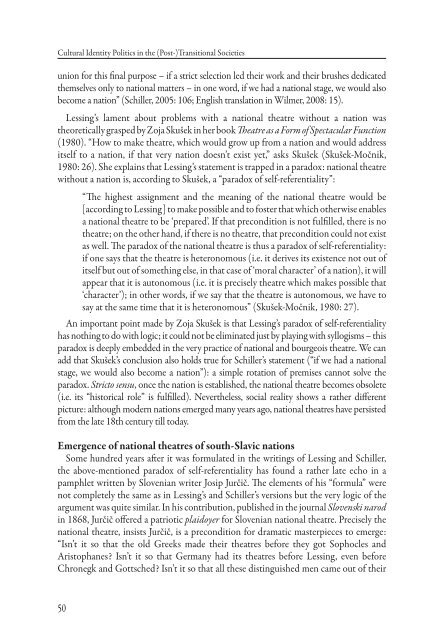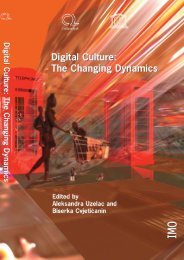free download in pdf format - Culturelink Network
free download in pdf format - Culturelink Network
free download in pdf format - Culturelink Network
You also want an ePaper? Increase the reach of your titles
YUMPU automatically turns print PDFs into web optimized ePapers that Google loves.
Cultural Identity Politics <strong>in</strong> the (Post-)Transitional Societies<br />
union for this fi nal purpose – if a strict selection led their work and their brushes dedicated<br />
themselves only to national matters – <strong>in</strong> one word, if we had a national stage, we would also<br />
become a nation” (Schiller, 2005: 106; English translation <strong>in</strong> Wilmer, 2008: 15).<br />
Less<strong>in</strong>g’s lament about problems with a national theatre without a nation was<br />
theoretically grasped by Zoja Skušek <strong>in</strong> her book Th eatre as a Form of Spectacular Function<br />
(1980). “How to make theatre, which would grow up from a nation and would address<br />
itself to a nation, if that very nation doesn’t exist yet,” asks Skušek (Skušek-Močnik,<br />
1980: 26). She expla<strong>in</strong>s that Less<strong>in</strong>g’s statement is trapped <strong>in</strong> a paradox: national theatre<br />
without a nation is, accord<strong>in</strong>g to Skušek, a “paradox of self-referentiality”:<br />
“Th e highest assignment and the mean<strong>in</strong>g of the national theatre would be<br />
[accord<strong>in</strong>g to Less<strong>in</strong>g] to make possible and to foster that which otherwise enables<br />
a national theatre to be ‘prepared’. If that precondition is not fulfi lled, there is no<br />
theatre; on the other hand, if there is no theatre, that precondition could not exist<br />
as well. Th e paradox of the national theatre is thus a paradox of self-referentiality:<br />
if one says that the theatre is heteronomous (i.e. it derives its existence not out of<br />
itself but out of someth<strong>in</strong>g else, <strong>in</strong> that case of ‘moral character’ of a nation), it will<br />
appear that it is autonomous (i.e. it is precisely theatre which makes possible that<br />
‘character’); <strong>in</strong> other words, if we say that the theatre is autonomous, we have to<br />
say at the same time that it is heteronomous” (Skušek-Močnik, 1980: 27).<br />
An important po<strong>in</strong>t made by Zoja Skušek is that Less<strong>in</strong>g’s paradox of self-referentiality<br />
has noth<strong>in</strong>g to do with logic; it could not be elim<strong>in</strong>ated just by play<strong>in</strong>g with syllogisms – this<br />
paradox is deeply embedded <strong>in</strong> the very practice of national and bourgeois theatre. We can<br />
add that Skušek’s conclusion also holds true for Schiller’s statement (“if we had a national<br />
stage, we would also become a nation”): a simple rotation of premises cannot solve the<br />
paradox. Stricto sensu, once the nation is established, the national theatre becomes obsolete<br />
(i.e. its “historical role” is fulfi lled). Nevertheless, social reality shows a rather diff erent<br />
picture: although modern nations emerged many years ago, national theatres have persisted<br />
from the late 18th century till today.<br />
Emergence of national theatres of south-Slavic nations<br />
Some hundred years aft er it was formulated <strong>in</strong> the writ<strong>in</strong>gs of Less<strong>in</strong>g and Schiller,<br />
the above-mentioned paradox of self-referentiality has found a rather late echo <strong>in</strong> a<br />
pamphlet written by Slovenian writer Josip Jurčič. Th e elements of his “formula” were<br />
not completely the same as <strong>in</strong> Less<strong>in</strong>g’s and Schiller’s versions but the very logic of the<br />
argument was quite similar. In his contribution, published <strong>in</strong> the journal Slovenski narod<br />
<strong>in</strong> 1868, Jurčič off ered a patriotic plaidoyer for Slovenian national theatre. Precisely the<br />
national theatre, <strong>in</strong>sists Jurčič, is a precondition for dramatic masterpieces to emerge:<br />
“Isn’t it so that the old Greeks made their theatres before they got Sophocles and<br />
Aristophanes? Isn’t it so that Germany had its theatres before Less<strong>in</strong>g, even before<br />
Chronegk and Gottsched? Isn’t it so that all these dist<strong>in</strong>guished men came out of their<br />
50



